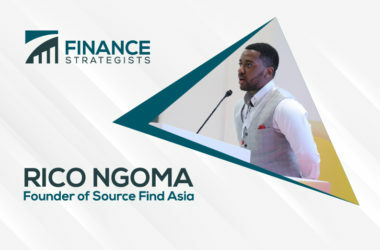Success leaves clues. Finance Strategists sat down with Rico Ngoma, founder of Source Find Asia. He shared his thoughts on the past, present, and future of the company, as well as the insight he gained from running the business. Q: Who are you and what’s your background? I was born in Zambia, Africa. At 10 years old my family migrated to Orlando, Florida, U.S.A., and then eventually moved to Toronto, Canada. Studied Business Admin and the year before I finished college, I stumbled on a YouTube channel called the “Elevator Life” (now called “Enter China”). I ended up watching all of their 100+ videos in the space of a week. I found them super relatable. It felt like the people in the videos were just like me and my friends, and it gave me the belief that I could do what they were doing. So I decided to move to China and start a business. I had nothing to lose. Worst case, I come back to Canada and get a 9 to 5 job. During the summer after graduation, I saved up some money and moved to Guangzhou, China in September 2014. Q: Who has been your biggest influence, and why did they have such a significant effect on you? Three people have the biggest influence on me: Nick Ramil, from Brinc.io, is one of my mentors. He helped me tremendously over the years. Seeing his accomplishments and investments in China and Hong Kong with manufacturing inspired me. He was also one of the hosts of a Youtube video I watched after college. Andy Church, from Insight Quality, another mentor of mine. The way he set up his business in terms of remote systems, basically having two teams that are self-sufficient within China, and managing the company from the US, became a blueprint for how we operate now with me managing our Guangzhou office while living in Manila. Lastly, my Dad. He was born in the Capital of (Lusaka) Zambia and grew up in a village. He helped put his younger siblings through school while he was in college, and then basically willed his way to make millions of dollars by computerizing the banking industry in Zambia. Considering the circumstances of how he grew up, and the lack of opportunities, versus what he accomplished, seems crazy to me. Also, seeing my parents run companies my whole life normalized the idea of running a company, and this is the main reason why I started so young. Q: Knowing what you know now, what would you have told yourself when you were in your twenties? I would tell myself to spend a little bit more time building relationships with your suppliers on a personal level. I spend a lot of time in factories. I think over the last five years, I’ve probably been to a hundred factories, and there were times I went on sourcing trips with clients, even with myself and my staff, which is 2-5 days. You learn a lot from spending that amount of time with management staff and the owners of the business. You’ll know whether that is the right factory for your client. When the facade drops, it would be business again. You’ll hear something from the owners of the factory that they wouldn’t tell the client directly. You’ll see if they are willing to grow as your client would want to. The way business was done in China 15 years ago was very much relationship-based, getting to know each other first on a personal level first before getting into the business side of things. And if you did that, that works in your favor. Q: What is Source Find Asia? Source Find Asia is a manufacturing-consulting company, especially if you want to make something in China. We connect you to the factories that we manage. We can handle the entire supply-chain process from finding your suppliers, to managing your productions, to quality control inspection, up to shipping management. On top of that, we release weekly Youtube videos (SourceFindAsia) and a weekly Podcast called “Made in China Podcast” – where we talk about entrepreneurship, business in China, and a little bit of lifestyle, as well. Q: What makes your company different from its competitors? Apart from during COVID-19, I actually lived in China for the past five years. A lot of our competitors don’t live in China or Asia anymore. We’re young, we are comfortable implementing new systems, and we’re innovative when it comes to the services we provide. And we’re one of the first companies that transitioned from the pure-trading model to how we offer our services now, where we get information from factories and suppliers and report back to our clients. Transparency is one of our core values in our business, so we present everything to them. We tailored our services to fit multiple types of companies. So, Instead of niching down to a specific product, we chose to niche down to a particular skill set. We are very good at identifying excellent or high-quality suppliers. It doesn’t matter what type of product it is. We have a system that will help verify and weed out the best suppliers. Q: What led you to start Source Find Asia? Technically, I didn’t start Source Find Asia. My business partner Michael Schierhorn, AKA ChinaMike, started the company back in 2011. When I came on, the company was shut down in 2014. But he’s still getting inquiries from his previous clients. The reason why he shut down the company is that he focused on his second business, which is being an agent for pro basketball players in China. When we connected through EnterChina, we re-started the company. Mike moved to China through an exchange program. After years of living in China, Source Find Asia started from getting requests from his friends and families to get particular products. He kept the interest in doing the business from there. One thing led to another, and he ended up getting lucrative deals with big companies in the US to source women’s accessories, hair products, and clothing. It was impossible for an average person from around the world to Google “Leather Boots Factories in China” and start making calls to these factories. That was absurd at that time. Mike made it possible by being physically in China. Q: What has the experience of building the business taught you? Over the years, my experience taught me the importance of systems and cross-cultural communications. When I had my first interns, I needed their help with researching factories for clients. My approach at that time was very western, like giving them the requirements and letting them figure out how to communicate with the factory. In 2 days of working, my interns were constantly asking me how to communicate with the factories. I realized they were also doing my job at the same time. So I decided to sit down and write how I would do it. I put together the very first Standard Operating Procedure (SOP), “How to Research and Communicate with Factories in Alibaba.” So in this case, I have to micromanage my staff to correct my approach. Then every week, I would allocate time to develop more SOPs to make it easier when you hire employees. Instead of training them 20 hours a week, you would hand over an updated and improved SOP. The cross-cultural communication aspect was essential to acknowledge, as well. When I started to get foreign employees, I had to pull back on micromanaging. When we had our Italian Marketing Intern, I realized that it wouldn’t be the best way to handle him. I had to allow him to do what he does and give him space. Q: Where do you see things headed for you in the next 5 years? I have a general plan of where the business will go, but I never tried to be too specific. Source Find Asia’s next few years is to expand our factory base outside of China. I have started to get product manufacturing contacts here in the Philippines. We want to tighten up our services. We want to create courses and masterclasses that would be evergreen, online, and available for anybody who wants to do Sourcing or who wants to improve on how they work with suppliers. On a personal level, I’m in the Philippines right now, I don’t see myself leaving anytime soon. But the goal is to go back to China every quarter. About Source Find Asia: Source Find Asia works side-by-side with your professional team to create detailed strategies tailored to your business. They’ll conceptualize, develop, and implement different strategies that capitalize on your business’s needs. Access a variety of services that range from research into new markets to entering dynamic new Asian territories and everything in between. For more information, see sourcefindasia.com.
Introduction
Who is Rico Ngoma?
Business

True Tamplin is a published author, public speaker, CEO of UpDigital, and founder of Finance Strategists.
True is a Certified Educator in Personal Finance (CEPF®), author of The Handy Financial Ratios Guide, a member of the Society for Advancing Business Editing and Writing, contributes to his financial education site, Finance Strategists, and has spoken to various financial communities such as the CFA Institute, as well as university students like his Alma mater, Biola University, where he received a bachelor of science in business and data analytics.
To learn more about True, visit his personal website or view his author profiles on Amazon, Nasdaq and Forbes.











